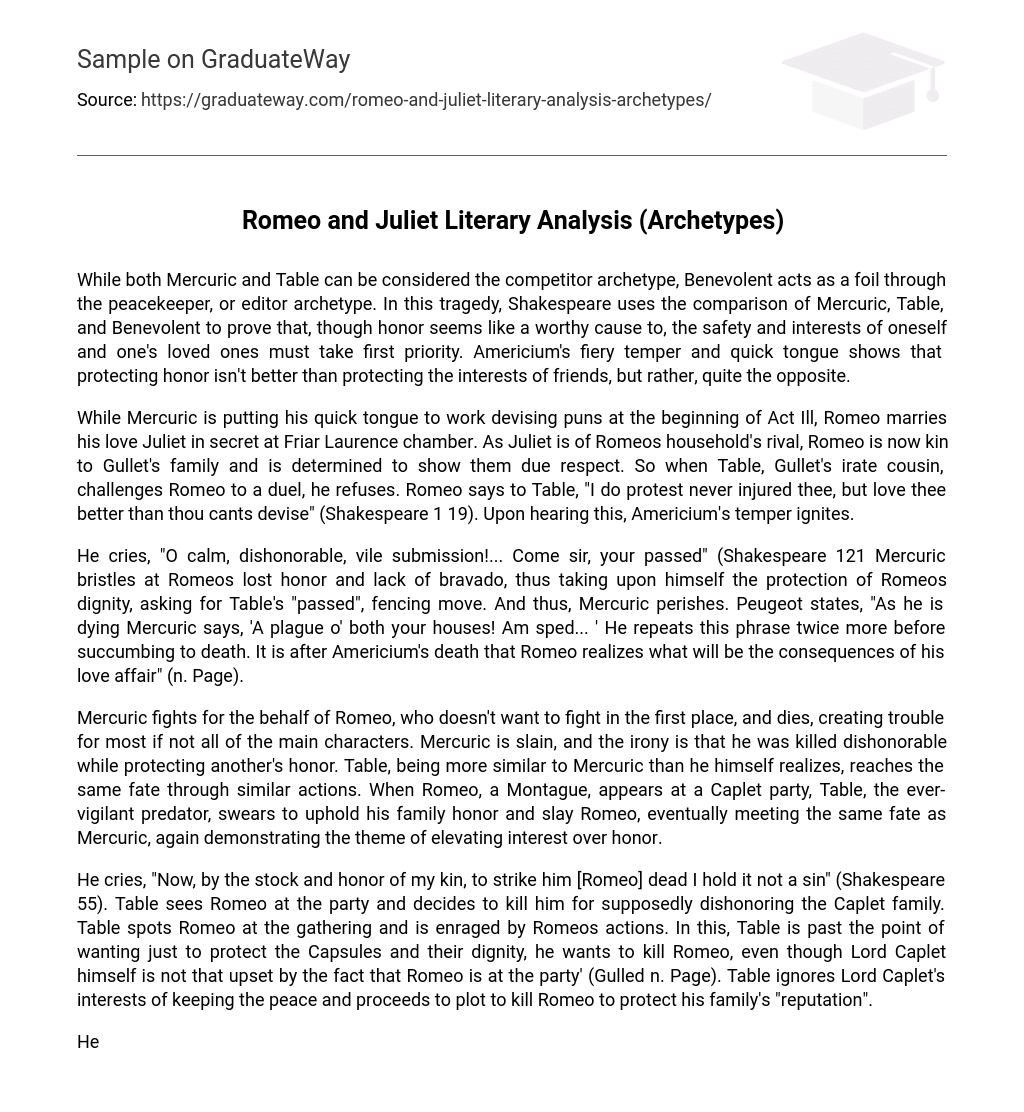While both Mercuric and Table can be considered the competitor archetype, Benevolent acts as a foil through the peacekeeper, or editor archetype. In this tragedy, Shakespeare uses the comparison of Mercuric, Table, and Benevolent to prove that, though honor seems like a worthy cause to, the safety and interests of oneself and one’s loved ones must take first priority. Americium’s fiery temper and quick tongue shows that protecting honor isn’t better than protecting the interests of friends, but rather, quite the opposite.
While Mercuric is putting his quick tongue to work devising puns at the beginning of Act Ill, Romeo marries his love Juliet in secret at Friar Laurence chamber. As Juliet is of Romeos household’s rival, Romeo is now kin to Gullet’s family and is determined to show them due respect. So when Table, Gullet’s irate cousin, challenges Romeo to a duel, he refuses. Romeo says to Table, “I do protest never injured thee, but love thee better than thou cants devise” (Shakespeare 1 19). Upon hearing this, Americium’s temper ignites.
He cries, “O calm, dishonorable, vile submission!… Come sir, your passed” (Shakespeare 121 Mercuric bristles at Romeos lost honor and lack of bravado, thus taking upon himself the protection of Romeos dignity, asking for Table’s “passed”, fencing move. And thus, Mercuric perishes. Peugeot states, “As he is dying Mercuric says, ‘A plague o’ both your houses! Am sped… ‘ He repeats this phrase twice more before succumbing to death. It is after Americium’s death that Romeo realizes what will be the consequences of his love affair” (n. Page).
Mercuric fights for the behalf of Romeo, who doesn’t want to fight in the first place, and dies, creating trouble for most if not all of the main characters. Mercuric is slain, and the irony is that he was killed dishonorable while protecting another’s honor. Table, being more similar to Mercuric than he himself realizes, reaches the same fate through similar actions. When Romeo, a Montague, appears at a Caplet party, Table, the ever- vigilant predator, swears to uphold his family honor and slay Romeo, eventually meeting the same fate as Mercuric, again demonstrating the theme of elevating interest over honor.
He cries, “Now, by the stock and honor of my kin, to strike him [Romeo] dead I hold it not a sin” (Shakespeare 55). Table sees Romeo at the party and decides to kill him for supposedly dishonoring the Caplet family. Table spots Romeo at the gathering and is enraged by Romeos actions. In this, Table is past the point of wanting just to protect the Capsules and their dignity, he wants to kill Romeo, even though Lord Caplet himself is not that upset by the fact that Romeo is at the party’ (Gulled n. Page). Table ignores Lord Caplet’s interests of keeping the peace and proceeds to plot to kill Romeo to protect his family’s “reputation”.
He confronts Romeo at during Act 3 scene 1, but is stopped by Mercuric. Table, in his rage, dispatches Mercuric. Romeo, furious upon his friend’s death, kills Table. Wise Benevolent, the peacekeeper, quickly takes Romeos safety as priority and urges him to run away, saying, “Romeo, away, be gone! The citizens are up, and Table slain (Shakespeare 125). Both Tables and Americium’s archetype of the Competitor, along with their mistaken loyalty to their friends and family, causes them to make the same fatal decisions. The complete opposite of the former two characters, Benevolent wisely protects the safety and interests of his loved ones.
In the beginning of the play, there is a huge brawl between the Montague and the Capsules. Benevolent appears in the midst of the fray and attempts to break up the fight while it is still young. “Unlike the Servants, or even the fathers, Benevolent appears not to want to fight, on the contrary, he strives to quell the servants” (Bloom n. Page). Instead of joining in the bloodshed, Benevolent hurriedly tries to disperse the fight, roaring, “Part fools! Put up your swords. You know not what you do… I do but keep the peace. Put up thy sword, or manage to part these men with me” (Shakespeare 15).
Later in Act Ill, Benevolent attempts once more to keep the peace. He suggests that Mercuric go to a tavern with him in order to avoid the Capsules in the heat of the day. ‘ ‘We talk here in the public haunt of men. Wither withdraw unto some private place and reason coldly of your grievances, or else depart. Here all eyes gaze on us” (Shakespeare 1 19). When Table arrives in his swaggering manner, he again suggest that the two quick-tempered foes should go into a private place to reason with words instead of the encouraged blows, thinking of the safety of both the opponents and the oncoming bystanders. He fails.
However, while Mercuric and Table all prey to death because of their stubborn decision to protect honor rather than safety and interests, Benevolent does the opposite, thus creating more good than harm and staying alive at the same time. Shakespearean use of these three character’s archetypes demonstrates that even though protecting a loved one’s honor can seem like true loyalty, real loyalty is about protecting safety of the person over their dignity or reputation. Mercuric is a competitor that fights for honor. Table is the same, and they both end of losing their lives. Benevolent, on the other hand, is a peacekeeper.





